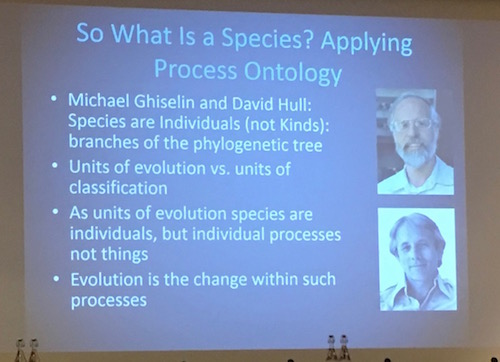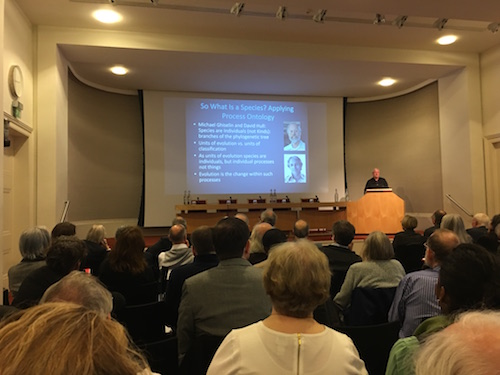 Evolution
Evolution
 Intelligent Design
Intelligent Design
Tense Atmosphere at Royal Society “New Trends in Evolutionary Biology” Meeting: A Report on Day 1
A meeting at London’s Royal Society is not just any old scientific conference. The Royal Society is among the most venerable in the world, presided over by Isaac Newton for the 25 years before he died. His death mask is on display to remind visitors of this history.
Thus a RS conference on “New Trends in Evolutionary Biology” is of special note. Paul Nelson expects “fireworks” before it’s done. The meeting got going today and will conclude on Wednesday. No advocate of intelligent design will address the distinguished audience, though one Discovery Institute Senior Fellow made a surprise appearance from the speaker’s stage (see below). From reports we’re receiving via friendly scientists in attendance, the atmosphere is tense. In fact two comments use that very same word.
Says one:
To me it was surprising that there was quite some tension between the proponents of the Modern Synthesis and those of the extended evolutionary synthesis. Why? What is the problem even if some novel evolutionary mechanisms are discovered?
Anyway, in my opinion it has not been demonstrated by the lectures presented today that the extended evolutionary synthesis provides the potential to create true novelties.
Another scientist shared photos and observations.
Q. You’re in London now, aren’t you? How is the meeting going? I would love to be able to give some first-hand impressions to readers at Evolution News.
Sure, it is quite interesting in several ways. There is some tangible tension between the proponents of the old Modern Synthesis and the newer Extended Synthesis. The “Third Way of Evolution” is not even mentioned. Today most talks addressed the phenomenon of phenotypic plasticity and of niche construction. Both processes may be relevant on a microevolutionary level, but none of the speakers even attempted to address the crucial problem of the origin of new complex structures and information. They presented examples of discontinuous change, but they were all either reductions or multiplications of pre-existing structures like fingers/phalanges.
Also interesting was that nearly everyone uses the term neo-Darwinism, which refutes those ID critics who maintain that the word neo-Darwinism is not used by “real scientists” but only by creationists.
Our scientist friend offered a breakdown of the individual presentations:
The first talk was by Gerd Müller, who presented an overview and defense of the Extended Synthesis. He carefully avoided any fundamental criticism of the neo-Darwinian process.
The second talk was by Douglas Futuyma, who basically said “If you read my book that I wrote twenty years ago it already contained most ideas of the so-called Extended Synthesis.” He insisted that only selection can account for improbable changes.
The third talk was by Sonia Sultan and it was extremely interesting. She introduced evidence for inherited but non-genetic adaptations involved in developmental plasticity (eco-evo-devo). E.g., tadpoles of the same genotype grow larger in ponds with salamander predation. She laid out that even an elaborate genotype model cannot accommodate plasticity phenomena. In the Q&A she was asked if this is Lamarckism, and answered: “Labels are trouble, but if you mean Lamarckian evolution in the sense of inheritance of acquired features, yes! It is definitely not supposed to happen.”
Fourth talk was by Russell Lande, also on phenotypic plasticity. He disagreed with Sultan and considers neo-Darwinian machinery as fully sufficient and adequate to explain the phenomenon. He also made the only derogatory comment toward ID: “We all here agree on Darwin, except for some fundamentalist fanatics out there.”
Next talk was Tobias Uller who considers that evolutionary processes are self-referential (and recurrent). He proposes a relational view as opposed to an autonomous view of the three main processes (variability, heredity, selection).
Next was John Dupré who argued in favor of a process ontology where species are individual processes and evolution is the change of these processes. He also said that species lack any characteristics that endure this change. He was asked in the Q&A how, given his statements, he can establish transtemporal identity of the process (same species at T1 and T2 undergoing change), because Whitehead was a Platonist who used the instantiation of non-material eternal objects for this purpose. He answered that he prefers to avoid the Whiteheadian baggage and basically appealed to a radical nominalism, in which we arbitrarily limit parts of a large mess into distinct individuals and processes.
Note that in Dupré’s talk a Google Image search failed in this slide — the image of Michael Ghiselin is actually Richard Weikart.
Q. Wait, are you serious about Weikart? Here it is. The second photo is a closeup:

Yes, that’s Richard all right. Dr. Weikart is a historian, a Senior Fellow with Discovery Institute’s Center for Science & Culture, and author of From Darwin to Hitler and other books. Did anyone realize the mistake (outside of Weikart’s friends in the audience)?
No, but we had fun. It’s definitely him.
Q. Go on.
Next was Paul Brakefield with a (to my taste) somewhat boring talk about the evolution of eyespots on butterfly wings.
The final and very good talk was by Kevin Laland about niche construction as developmental bias and an important evolutionary process. But he also failed to establish any role for this process in macroevolution.
Q. Are you getting any sense of whether they’ve left more provocative talks to the last two days?
Nope, they will stay very tame and avoid any impression that something is fundamentally wrong with neo-Darwinism.
It’s all about an extension of the Modern Synthesis or at best an extension of the Extended Synthesis. There’s a lot of talking past each other, a lot of quarreling about words, terminology, and definitions. Some alpha male behavior and denial of any necessity for an Extended Synthesis. And some interesting research on the level of small changes, that is, microevolution.
Q. What kind of alpha male behavior?
In the way of “This is nothing new, we knew this for a long time, the phenomena exist but are irrelevant, appeal to authority,” etc.
Q. Despite their trying to avoid giving an impression of something “fundamentally wrong,” would an informed observer read behind the talks and understand that something is indeed seriously wrong?
Maybe not. The closest would be Gerd Müller’s talk, where he said that the Modern Synthesis has several explanatory deficits including the explanation of phenotypic complexity. But then none of his elements of the Extended Synthesis even addressed this issue.
Q. You mentioned a derisory allusion by Russell Lande to Darwin skeptics. Do they know we’re in the audience?
No, I think he was not aware of that. But good ol’ Larry Moran is here and of course recognized some familiar faces.
Q. Any incidental observations? How’s the food? Jerry Coyne at Why Evolution Is True rarely fails to post photos of his meals when he travels. I wouldn’t expect that of you.
Lunch at the Royal Society was surprisingly good (given the reputation of the British kitchen).
Larry Moran complained about the quality of the presentations and said to [Evolution News contributor] Jonathan M. that “You folks are so much better at giving talks.” He also asked for a photo with him (for his trophy photo collection with us ID supporters).
Here is a picture from this morning’s walk to the Royal Society. Very distinguished building with old paintings of people like Newton and Robert Boyle. The Royal Society itself is not visible in the photo.

Q. Nice scene of street and traffic. Will we hear from you again?
My report from the second day will follow tomorrow.
Fantastic. Thank you! We’ll look forward to it.


